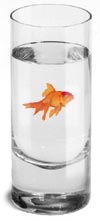
- Why is the sky blue?
- Do fish drink?
- Why does the moon follow us?
By the time you reached six or seven years old, you probably stopped asking so many questions about the things around you. Perhaps you realized that the endless stream of questions began to annoy more than charm your parents. Perhaps you learned how to find the answers yourself. Perhaps, as many learning theorists suggest, your schooling had acclimated you to posing "appropriate" questions and giving "correct" answers.
In my master’s project thesis, I hope to reawaken and re-enable this spirit of inquiry and engagement in the world for adult learners, through the development of an interconnected set of services I call free range learning support.
- In this introduction:
- Illuminating the concept.
- Tracing the origins of the idea.
- Examining the term free range learning support
- Asking why services are the best match for learning.
| NEXT> Illuminating the concept. |
Fresh:
Free Range Learning SupportBy Chris Noessel, chrisnoessel@
 .com
.com
Abstract
This paper is part of a master’s thesis project conducted at Interaction Design Institute Ivrea. In it, the author presents a design vision and experience prototypes for a service that supports mobile, lifelong learning.Keywords: mobile learning, free range learning, service design, interaction design
Thesis Committee
Gillian Crampton-Smith
Director, Interaction Design Institute Ivrea
Walter Aprile
Associate Professor, Interaction Design Institute Ivrea
Nathan Shedroff
Explorer and Visiting Professor, Interaction Design Institute Ivrea
This project was originally submitted on 29 May 2003.
It was accepted by the thesis committee on 23 JUNE 2003.